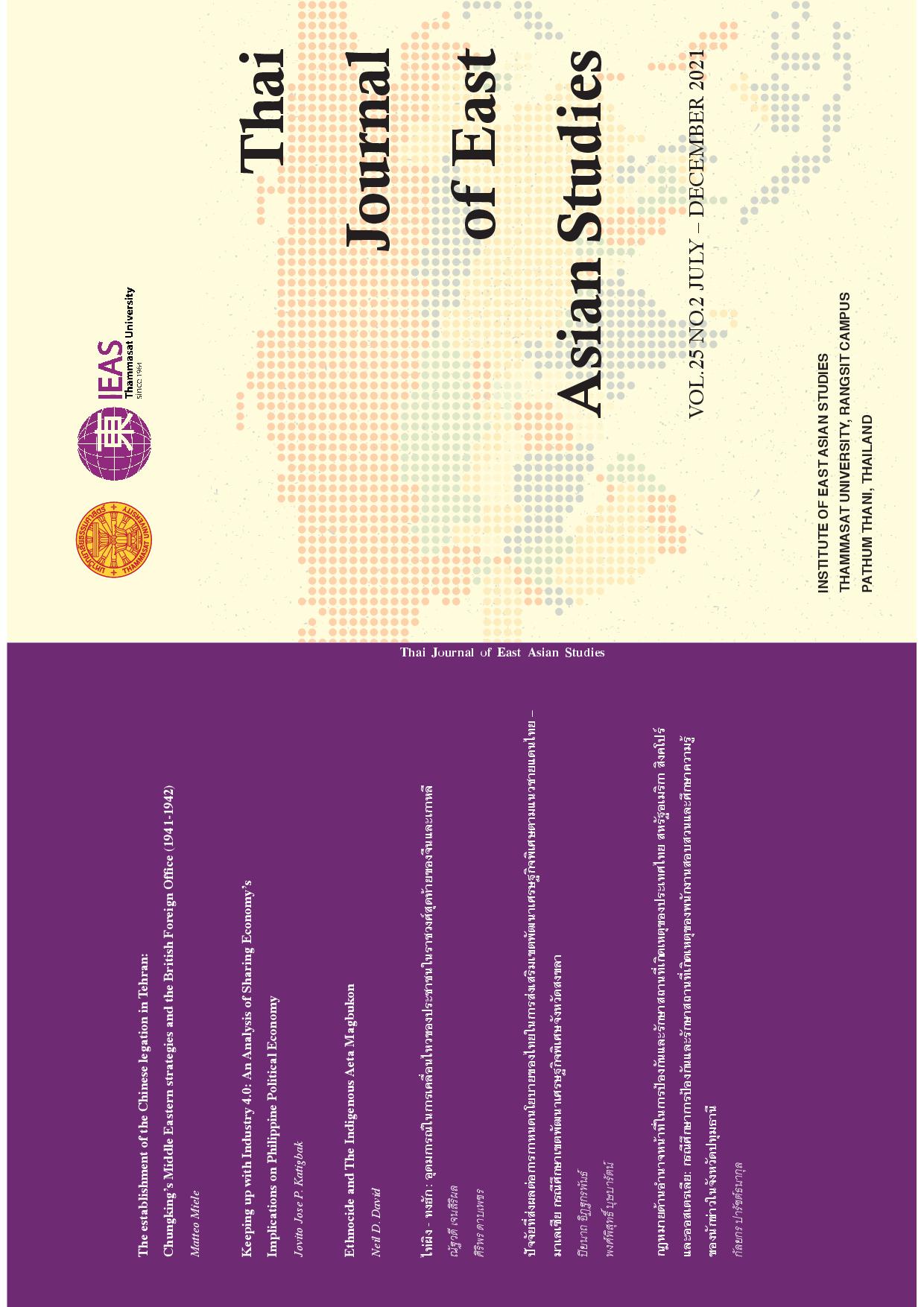Keeping up with Industry 4.0: An Analysis of Sharing Economy’s Implications on Philippine Political Economy
Keywords:
sharing economy, political economy, Fourth Industrial Revolution (Industry 4.0), development, globalizationAbstract
Philippine firms are optimistic about the opportunities presented by Industry 4.0 but only 27 percent can keep up with the changing technological landscape due to high fixed-capital and licensing costs. The World Economic Forum’s 2018 Readiness Assessment underscores that the country has a strong production base for Fourth Industrial Revolution-related activities but is perennially challenged by weak institutional framework, inadequate technology platforms, and insufficient human capital. The government responded through key Industry 4.0-related
policies and plans such as the Comprehensive National Industrial Strategy and Inclusive Innovation
Industrial Strategy, National Technical Education and Skills Development Plan (2018–2022), and Science for Change Program. Despite this stride, the country is still perennially beset by issues of poverty, corruption, and wealth inequality. Hence, the introduction of the sharing economy (SE) in the Philippines may be taken as a welcome development given the current state of the country’s political economy. Using a descriptive-exploratory approach, this study generated two key findings: (1) the tenets of the liberal perspective are the same forces that continuously
underpin the emergence of Industry 4.0 and SE but few deviations can be observed; and (2) SE is expected to further empower Filipino individuals through introducing new means of carrying out
production and consumption-related tasks but a proactive regulatory agency is necessary to ensure inclusive growth; and. This study concludes that embodiment of adaptive agility by Philippine
government is a key element in effectively competing in an environment increasingly being driven by
unprecedented ideas and never-before-seen technologies.
Downloads
References
Asian Development Bank. (2021). Reaping the Benefits of Industry 4.0 through Skills Development in the Philippines. http://dx.doi.org/10.22617/SPR200326
Barnes, S. J., & Mattsson, J. (2016). Understanding current and future issues in collaborative consumption: A four-stage Delphi study. Technological Forecasting and Social Change, 104, 200-211. https://doi.org/10.1016/j.techfore.2016.01.006
Bello, W., Docena, H., Guzman, M. D., & Malig, M. L. (2004). The Anti-Development State: The Political Economy of Permanent Crisis in the Philippines. Zed Books.
Bernama. (2018, January 10). MITI hopes to announce National Industry 4.0 policy before mid-year. Malay Mail. http://www.themalaymailonline.com/money/article/miti-hopes-to-announcenational-industry-4.0-policy-before-mid-year
Botsman, R. (2015, October 20). The sharing economy: dictionary of commonly used terms. Medium. https://medium.com/@rachelbotsman/the-sharing-economy-dictionary-of-commonly-usedterms-d1a696691d12
Cannon, S., & Summers, L. H. (2014, October 13). How Uber and the Sharing Economy Can Win Over Regulators. Harvard Business Review. https://hbr.org/2014/10/how-uber-and-the-sharingeconomy-can-win-over-regulators
Clark, B. (1998). Political Economy: A Comparative Approach (2nd ed.). Praeger.
Cornell University, INSEAD, & WIPO. (2019). The Global Innovation Index 2019: Creating Healthy Lives—The Future of Medical Innovation. https:// www.wipo.int/edocs/pubdocs/en/wipo_pub_gii_2019.pdf
Christensen, C. M., Raynor, M. E., & McDonald, R. (2015, December). What is Disruptive Innovation?. Harvard Business Review. https://hbr.org/2015/12/what-is-disruptive-innovation
Cusumano, M. (2015). How Traditional Firms Must Compete in the Sharing Economy. Communications of the ACM, 58(1), 32-34.
Duhigg, C., & Kocieniewski, D. (2012, April 28). How Apple Sidesteps Billions in Taxes. The New York Times. https://www.nytimes.com/2012/04/29/business/apples-tax-strategy-aims-at-low-taxstates-and-nations.html
European Commission. (2017). Key Lessons from national industry 4.0 policy initiatives in Europe. https://ec.europa.eu/growth/tools-databases/dem/monitor/sites/default/files/DTM_Policy%20initiative%20comparison%20v1.pdf
Gill, S. (1994). Knowledge, Politics, and Neo-Liberal Political Economy. In R., Stubbs & G. R. D., Underhill (Eds.). Political Economy and the Changing Global Order (pp. 75-88). The Macmillan Press.
Hobbes, T. (1651). Leviathan or the Matter, Form and Power of a Commonwealth, Ecclesiastical and Civil (4th ed.). George Routledge ad Sons.
Hutchcroft, P., & Rocamora, J. (2003). Strong demands and weak institutions: Addressing the democratic deficit in the Philippines. Journal of East Asian Studies, 3(1), 259–292.
International Labor Organization. (2017, June 1). ASEAN in Transformation—How Technology is Changing Jobs and Enterprises —The Philippines Country Brief. ILO Country Office for the Philippines. https://www.ilo.org/actemp/publications/WCMS_579667/lang--en/index.htm
Katigbak, J. J. P. (2018). Is the Philippines Heading Towards a Social Market Economy? Lessons from Germany. CIRSS Insights, 5(1), 1-9.
Katz, V. (2015). Regulating the Sharing Economy. Berkeley Technology Law Journal, 30(4), 1067–1126. Keohane, R.O., & Nye, J.S. (1987). Power and Interdependence Revisited. International Organization, 41(4), 725-753.
Magcamit, M. (2016, April 13). The enduring curse of patronage politics: Why Filipinos should not elect a patrimonial president. UP sa Halalan 2022. https://halalan.up.edu.ph/?s=The+enduring+curse+of+patronage+politics%3A+Why+Filipinos+should+not+elect+a+patrimonial+president
Mair, J., & Reischauer, G. (2017). Capturing the dynamics of the sharing economy: Institutional research on the plural forms and practices of sharing economy organizations. Technological Forecasting and Social Change, 125, 11-20.
Manacsa, R., & Tan, A. (2012). Strong republic sidetracked: Oligarch dynamics, democratization, and economic development in the Philippines. Korea Observer, 43(1), 47-87.
McKinsey Global Institute. (2013). Disruptive technologies: Advances that will transform life, business, and the global economy. McKinsey and Company.
Murillo, D., Buckland, H., & Val, E. (2017). When the sharing economy becomes neoliberalism on steroids: Unravelling the controversies. Technological Forecasting and Social Change, 125, 66-76.
Nielsen. (2014). Asia Pacific consumers embrace the share economy. http://www.nielsen.com/apac/en/insights/news/2014/asia-pacific-consumers-embrace-the-share-economy.html
O’Brien, R., & Williams, M. (2010). Global Political Economy (3rd ed.). Palgrave Macmillan. Petropoulos, G. (2017). An economic review of the collaborative economy. Policy Contribution, 5. http://bruegel.org/wp-content/uploads/2017/02/PC-05-2017.pdf
PricewaterhouseCoopers. (2014). The sharing economy: how will it disrupt your business? Megatrends: the collisions. http://pwc.blogs.com/files/sharing-economy-final_0814.pdf
Philippine Statistics Authority. (2020). Updated 2015 and 2018 Full Year Official Poverty Statistics. https://psa.gov.ph/poverty-press-releases/nid/162559
Quimpo, N. (2005). Oligarchic patrimonialism, bossism, electoral clientelism, and contested democracy in the Philippines. Comparative Politics, 37(2), 229-250.
Raman, S. (2017). Singapore’s advanced manufacturing avatar “Industry 4.0”. https://www.singaporebusiness. com/2017/singapores-advanced-manufacturing-avatar-industry.html
Roxas, M. C. M. (2016). The Sharing Economy in the Global South and Sustainability Transitions. http://lup.lub.lu.se/luur/download?func=downloadFile&recordOId=8890917&fileOId=8890919
Schor, J. (2014). Debating the Sharing Economy. http://greattransition.org/publication/debating-thesharing-economy
Schwab, K. (2015, December 15). The Fourth Industrial Revolution: What It Means and How to Respond. Foreign Affairs. https://www.foreignaffairs.com/articles/2015-12-12/fourth-industrial-revolution
Transparency International. (n.d.). Corruption Perceptions Index 2020. https://www.transparency.org/en/cpi/2020/index/phl
USAID-STRIDE. (2019). Philippines Innovation Ecosystem Assessment 2019 Update. https://stride.org.ph/wp-content/uploads/2020/09/2019_STRIDE-Philippines-Innovation-Ecosystem-Assessment-Update_6.30.20.pdf
Williamson, J. (2004). The Washington Consensus as Policy Description for Development. https://piie.com/sites/default/files/publications/papers/williamson0204.pdf
World Bank. (n.d.). Gini index – Philippines. https://data.worldbank.org/indicator/SI.POV.GINI?locations=PH
World Economic Forum. (2017). Collaboration in Cities: From Sharing to Sharing Economy. http://www3. weforum.org/docs/White_Paper_Collaboration_in_Cities_report_2017.pdf
Downloads
Published
How to Cite
Issue
Section
License
Copyright (c) 2021 Thai Journal of East Asian Studies

This work is licensed under a Creative Commons Attribution-NonCommercial-NoDerivatives 4.0 International License.



